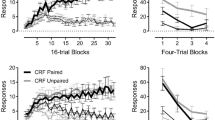Abstract
Electrodermal and plethysmographic recordings were obtained from three groups of alcoholic patients. The groups differed with respect to instructions given for response to a series of words spoken by the experimenter. Group A was told to report verbally their first associations for each word presented. Group B received instructions to think of an association for each word without reporting it. Group C was to respond to each word by repeating it after it was spoken by the experimenter. The instructions did not have the predicted differing effects upon rate of EDR habituation. However, the over-all amplitude of EDR was lower for Group B than for Group A or C. We observed very little habituation of the plethysmographic OR as measured by per cent of subjects responding to each word. As with the EDR data, Group B shows less responsivity, i.e., this group produced significantly fewer plethysmographic responses over all words than did either of the other two groups.
The relative importance of association and of verbal responding to a stimulus word for eliciting autonomic responses was considered.
Similar content being viewed by others
References
Anokhin, P. K.: The role of the orienting exploratory reaction in the formation of the conditioned reflex. InOR and Exploratory Behavior, Voronin, Leontiev, Luria, et al. (Eds.) Moscow, Acad. Pedagog. Sci. USSR, 1958, Transl. and publ. AIBS, Washington, D. C., 1965.
Campos, J. J., and Johnson, H. J.: The effects of verbalization instructions and visual attention on heart rate and skin conductance.Psychophysiol,2: 305–310, 1966.
Edwards, A. L.: Experimental Design in Psychological Research. New York, Rinehart, 1950.
Gale, E., and Stern, J. A.: Conditioning of the electrodermal orienting response.Psychophysiol.3:291–301, 1967.
Geer, J. H.: Fear and autonomic arousal.J. Abnormal Psychol.,71:253–255, 1966.
Maltzman, I., and Raskin, D. C.: Effects of individual differences in the OR on conditioning and complex processes.J. Exp. Res. and Personal.,I:1–16, 1965.
Razran, G.: The observable unconscious and the inferable conscious in current Soviet psychophysiology.Psychol. Rev.,68:81–147, 1961.
Riess, B. F.: Semantic conditioning involving the galvanic skin reflex.J. Exp. Psychol.,26:238–240, 1940.
Riess, B. F.: Genetic changes in semantic conditioning.J. Exp. Psychol.,36: 143–152, 1946.
Snedecor, G. W.:Statistical Methods. Ames, Iowa: Iowa State Coll. Press, 1946.
Stern, J. A., and Sila, B.: Autonomic responsivity and electric convulsive therapy.J. Neuropsychiat.,I:100–103, 1959.
Stern, J. A., Sila, B., and Word, T. J.: Observations on the effect of electroconvulsive therapy and pharmacotherapy on the psychogalvanic response.J. Neuropsychiat.,2:149–152, 1961.
Stern, J. A., Surphlis, W., and Koff, E.: Electrodermal responsiveness as related to psychiatric diagnosis and prognosis.J. Psychophysiol.,2:51–61, 1965.
Stern, J. A., Winokur, G., Stewart, M., and Leonard, C.: Electrodermal conditioning: Some further correlates.J. Nerv. Ment. Dis.,137:479–486, 1963.
Sokolov, Y. N.: Perception and the Conditioned Reflex. New York, MacMillan Co., 1963.
Sokolov, Y. N.: Higher nervous functions: The orienting reflex.Annual Rev. of Physiol.,25:545–580, 1965.
Voronin, L. G., Leontiev, A. N., Luria, A. R., Sokolov, Y. N., and Vinogradova, O. S. (Eds.): Orienting Reflex and Exploratory Behavior. Washington, American Institute of Biological Science, 1965.
Weiner, H.: Some psychological factors related to cardiovascular responses. In Roessler and Greenfield (Eds.) Physiological Correlates of Psychological Disorders. Madison, Univ. Wisconsin Press, 1962.
Author information
Authors and Affiliations
Additional information
This research was conducted at the Malcolm Bliss Mental Health Center, St. Louis, Missouri, and was supported in part by Public Health Service Research Grant No. MH 02755 and MH 7081 from the National Institute of Mental Health.
Rights and permissions
About this article
Cite this article
Gross, K., Stern, J.A. Habituation of orienting responses as a function of “instructional set”. Conditional Reflex 2, 23–36 (1967). https://doi.org/10.1007/BF03034093
Issue Date:
DOI: https://doi.org/10.1007/BF03034093




